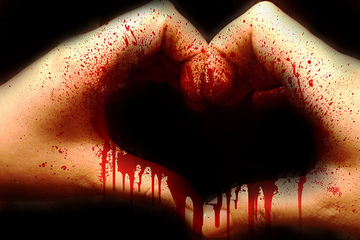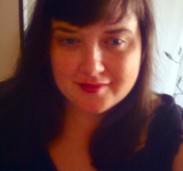 Photo credit: (257/365) Bloody heart by Sarah G via Flickr. Photo credit: (257/365) Bloody heart by Sarah G via Flickr. Is horror a genre, or is it an aesthetic? This guest post by Elizabeth Twist, a writer and life-long horror fan, seeks to answer that question and suggest a new understanding of "horror" in film and fiction. I am a horror fan and much of what I write is horror – or at least, I think of it that way. I am frequently subject to the following exchange: Well-Meaning Interlocutor: "What do you like to read?" I enjoy challenging people on this point. When they say they hate horror, often they mean they hate gore porn or slasher movies. Though I personally appreciate even the gorier manifestations of horror, the reality is, you can find horror in all sorts of flavours. Do you like the original Twilight Zone? Did you thrill to Poltergeist when you were a tween? Ever dip into Stephen King's massive oevre? Love the spooky chills of classic movies like The Innocents? How about your annual viewing of A Christmas Carol? Any fond memories of Scooby Doo? Casper the Friendly Ghost? Beetlejuice? All of these works have horror elements. Some are firmly placed in the horror canon; others merely dip their toes in the horror pool. The problem lies in definitions. For many people, horror is "that gross stuff I don't like." It is as if we each have our own sliding scale of what we can handle and what we can't, and for those who haven't thought it through, horror is anything that exceeds their tolerances. It is time for a new understanding of horror. There have been attempts to argue that horror is tricky because it is not definable in the same way as other genres, like science fiction or fantasy. In his 1982 introduction to the anthology Prime Evil, editor Douglas Winter famously noted, "Horror is not a genre, like the mystery or science fiction or the western. It is not a kind of fiction, meant to be confined to the ghetto of a special shelf in libraries or bookstores. Horror is an emotion." (source) Oft repeated by horror enthusiasts, this statement points out an important part of the horror problem: horror doesn't behave like other genres. Rather than retaining discrete characteristics, horror is excellent at infiltrating other genres. Science fiction and horror go together brilliantly: the Alien franchise is ample proof of that. Fantasy and horror have been frequent bedfellows, most recently and ubiquitously in urban fantasy's trifecta of tropes: vampires, werewolves, and fairies. Pyschological fiction has its fair share of monsters (Hannibal Lecter, anyone?). Mystery quite necessarily gravitates to the seedier side of humanity. Any literature can invoke the emotion of horror, but too often, that emotion is invisible to the creator or audience of a work, and so the horror label is not necessarily applied. (See William Peter Blatty's recent claim, in his October 2011 interview with the Huffington Post, that he thought he was writing "a supernatural detective story" when he crafted The Exorcist. Fortunately the novel's and film's audience saw things otherwise.) To give horror its due, I think we have to move past defining it as an emotion. At best, Winter's is a slippery concept. What freaks you out might not bother me in the slightest. Emotions are not inherent in books or films or art, but in those who experience them. You can't walk up to your copy of Dracula and ask, "Excuse me, are you the emotion of horror?" We can go further. As a first step, I propose that horror literature and film are not limitied to evoking fear, disturbance, shock, or terror. There is much more to absorb under the horror umbrella, including the wide range of films and books and comics and cartoons that draw on horror tropes but work to evoke other emotions. Tim Burton has built a career on nostalgic and whimsical explorations of horror tropes through films like The Corpse Bride and Nightmare Before Christmas. Horror tropes can be used to hilarious effect (Christopher Moore's You Suck, Bite Me, and Bloodsucking Fiends; zom com). Common horror themes – hauntings, monsters, dubious transformations, disturbing discoveries – can work toward a plethora of emotional and cognitive effects, including wonder, sorrow, rage, joy, deep gladness, arousal, paradox and dissonance. How to resolve this conundrum? How do we define horror when its emotional impact might not be horrible? I propose this: horror is an aesthetic. The horror aesthetic encompasses a certain typical emotional register, but also common tropes, supernatural and mundane. The horror aesthetic may be put to use by any genre of literature or film. In any given work, it may be so pervasive that the work as a whole must be deemed a work of horror. Defined as such, horror is free to creep wherever it pleases. It can turn up anywhere, and even colonize a work completely. Many horror fans have bemoaned the apparent appropriation of horror tropes in recent times. Twilight leaps to mind as a sparkling shining example of a work that uses a traditional horror trope in order to bolster an old-fashioned (and otherwise insupportable) romantic storyline. Fans of bloodsucking fiends have complained copiously about this watering down of their beloved vampires. Despair not, I say. Rather than view recent manifestations of the vampire and other beasts as an appropriation of the horror aesthetic, I choose to think of them as the first signs of infection. The horror aesthetic is invading the popular consciousness once more, priming the public imagination for a fresh wave of blood. It might not always be at the forefront. It might be easily dismissed or disregarded, but horror will never die.  Elizabeth Twist is a writer, plague enthusiast, and part-time mystic living in Hamilton, Ontario. She earned a PhD in 2005 by combing 400 year old medical manuals for evidence that the plays of Shakespeare might have been inspired by syphilis and the Black Death. Her short fiction has appeared in Escape Clause: A Speculative Fiction Anthology, Enchanted Conversation, and One Buck Horror. She has stories forthcoming in Dark Faith 2 and Suction Cup Dreams: An Octopus Anthology.
0 Comments
Your comment will be posted after it is approved.
Leave a Reply. |
World Weaver PressPublishing fantasy, paranormal, and science fiction. Archives
February 2024
|
- Home
-
Books
-
All Books
>
- Beyond the Glass Slipper
- Bite Somebody
- Bite Somebody Else
- Black Pearl Dreaming
- Cassandra Complex
- Causality Loop
- Clockwork, Curses, and Coal
- Continuum
- Corvidae
- Cursed: Wickedly Fun Stories
- Dream Eater
- Equus
- Fae
- Falling of the Moon
- Far Orbit
- Far Orbit Apogee
- Fractured Days
- Frozen Fairy Tales
- Glass and Gardens: Solarpunk Summers
- Glass and Gardens: Solarpunk Winters
- Grandmother Paradox
- Grimm, Grit, and Gasoline
- Haunted Housewives
- Heir to the Lamp
- He Sees You When He's Creepin': Tales of Krampus
- Into the Moonless Night
- Jack Jetstark's Intergalactic Freakshow
- King of Ash and Bones (ebook)
- Krampusnacht
- Last Dream of Her Mortal Soul
- Meddlers of Moonshine
- Mothers of Enchantment
- Mrs Claus
- Multispecies Cities
- Murder in the Generative Kitchen
- Recognize Fascism
- Scarecrow
- Sirens
- Shards of History
- Shattered Fates
- Skull and Pestle
- Solarpunk (Translation)
- Solarpunk Creatures
- Solomon's Bell
- SonofaWitch!
- Speculative Story Bites
- Trenchcoats, Towers, and Trolls
- Weredog Whisperer
- Wolves and Witches
- Anthologies and Collections
- Novels
- Novellas
- Fairy Tale
- Fantasy
- Romance
- Science Fiction
- Urban/Contemporary Fantasy
- Young Adult SFF
-
All Books
>
- Blog
- About
- Contact
- Press / Publicity
- Newsletter Signup
- Privacy Policy
- Store

 RSS Feed
RSS Feed